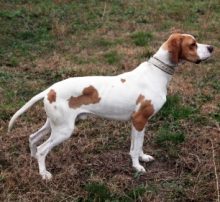English Pointer
Lifestyle Needs

The Pointer is a large, strong, athletic dog whose job is to ‘point out’ game on the hunting field by. He is able to run fast over a considerable area and generally needs more than two hours exercise every day. Ideally he should live a house with a garden with plenty of opportunity to run free in the open countryside. The Pointer’s smooth, short coat is easy to keep clean, but he will need regular grooming. Pointers do not make ideal family pets due to their strong hunting drive. The temperament in this breed can be challenging if care is not taken to ensure a good temperament background.
Genetic Diversity
(Known as Coefficient of Inbreeding: 'COI'. It should be as low as possible.)
The UK Kennel Club breed average COI is 8.9% - See 'A Beginners Guide to COI'
Gene Pool Size
(Known as Effective Population Size: 'EPS')
61.5
EPS is a measure of how many individuals are contributing genetically to a breed population. It is a measure of the size of the gene pool in a breed. Lower than 100 is considered critical by conservationists and below 50 brings a breed close to extinction. For more information see the Kennel Club article.
Health and Welfare Problems due to Conformation
(Body shape and physical characteristics)
- Gastric dilatation volvulus (GDV) (Bloat/Torsion)
BVA/KC Health Schemes: www.bva.co.uk/chs
- Hip dysplasia: breed 5 year mean score 8.9 (parents should be lower)
- Elbow Dysplasia: score should be as low as possible
- Eye disease: Progressive retinal atrophy (PRA) (annual testing)
Estimated Breeding Values (EBVs) : No EBVs are currently available for this breed
www.thekennelclub.org.uk/about-ebvs
DNA Tests Available
DogWellNet and IPFD Harmonisation of Genetic Testing for Dogs (HGTD)
www.dogwellnet.com/breeds
- Acral Mutilation Syndrome (AMS)
- von Willebrands Disease (vWD) Type 2
Availability of a DNA test does not mean that it is always necessary or even desirable for breeders to use this test.
Other Breed-Specific Health Screening Schemes
None known
Ask the breeder to show you the certificates for the above tests/screening for both parents. If any of the above tests have not been considered necessary by the breeder (and there may be good reasons), ask her to explain why.
Other Diseases Reported
(For which there are currently no genetic or screening tests for sire or dam)
- Heart disease: Dilated cardiomyopathy (DCM)
- Cancer
- Allergic skin disease
- Addisons disease
- Urinary incontinence
- Epilepsy
- Osteochondritis – shoulder
- Deafness
- Cranial cruciate ligament rupture
- Lipoma
(Cross-check with German Smoothhaired and Wirehaired Pointers as some diseases are common to all Pointers)
Ask the breeder about the medical history of the parents, grandparents and great grandparents. Consider carefully whether to purchase a puppy if some of these or other diseases are in the family line.
Ask about the breeder’s policy in cases of serious genetic diseases occurring to your puppy in later life. Good breeders will request to be informed of such events in order to improve future breeding decisions.
You are strongly advised to buy from a breeder who uses (or is prepared to use) the AWF Puppy Contract and Puppy Information Pack (PIP): www.puppycontract.org.uk
The breeder should also be familiar with the CFSG/DBRG Code of Practice for Dog Breeding